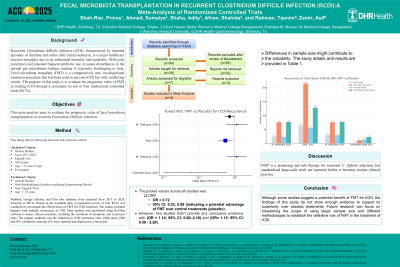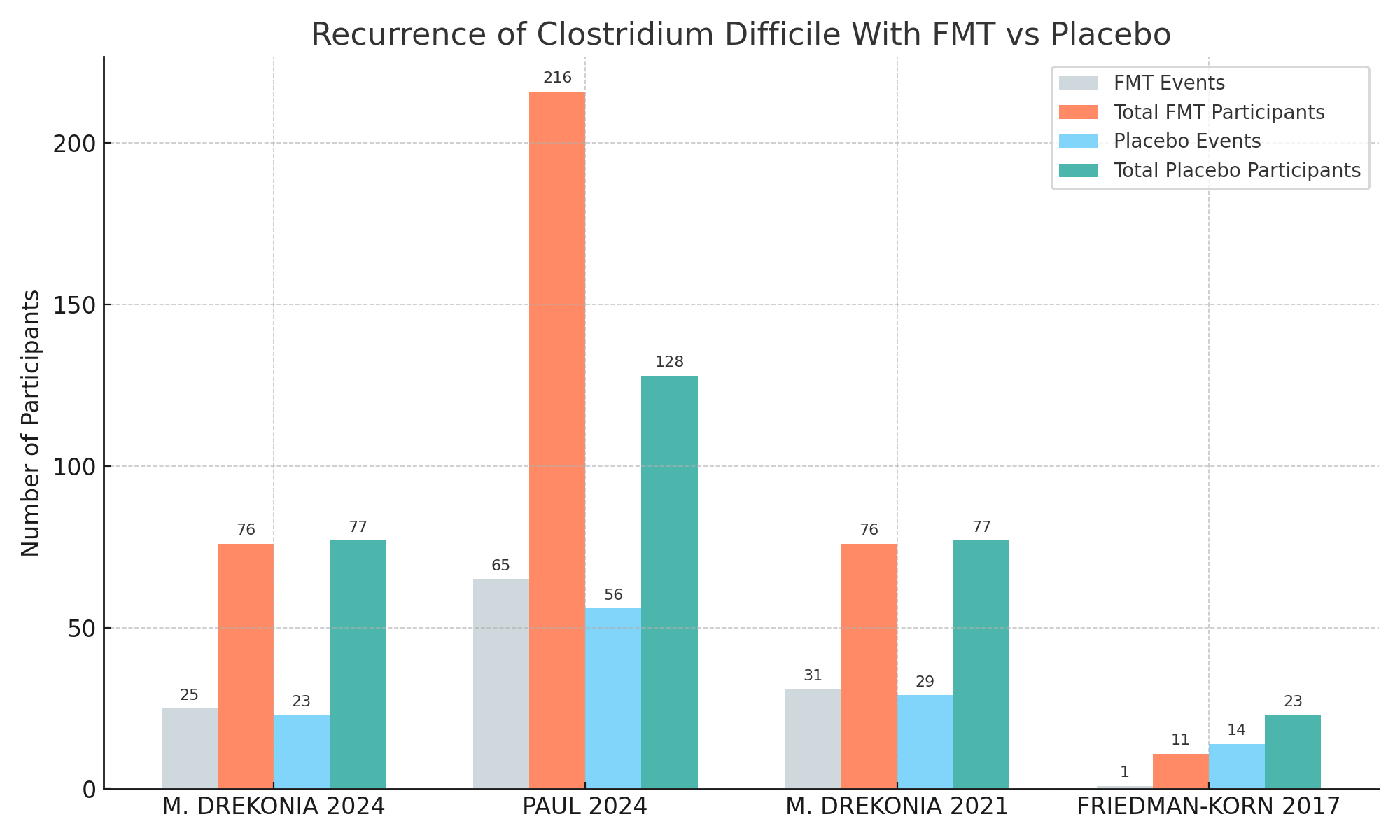Tuesday Poster Session
Category: Infections and Microbiome
P5558 - Fecal Microbiota Transplantation for Recurrent Clostridioides difficile Infection: A Meta-Analysis of Randomized Controlled Trials
Tuesday, October 28, 2025
10:30 AM - 4:00 PM PDT
Location: Exhibit Hall

Has Audio

Prince Shah-Riar, MD
DHR Health, Edinburg, Tx
Edinburg, TX
Presenting Author(s)
Prince Shah-Riar, MD1, Sumaiya Ahmed, MBBS2, Aditi Saha, MBBS3, Shahida Afnan, MBBS, MD4, Tasnim Rahman, MBBS5, Asif Zamir, MD, FACG6
1DHR Health, Edinburg, Tx, McAllen, TX; 2North South University, Tallahassee, FL; 3University of Dhaka, Cleveland, OH; 4Shaheed M. Monsur Ali Medical College, Sirajganj, Dhaka, Dhaka, Bangladesh; 5Wenzhou Medical University, Fort Collins, CO; 6DHR Health Gastroenterology, Edinburg, TX
Introduction: Recurrent Clostridium difficile infection (rCDI) poses a substantial burden on patients and healthcare systems due to high recurrence rates, increasing antimicrobial resistance, and limited long-term success with conventional antibiotic therapies. Fecal microbiota transplantation (FMT) has gained attention as a novel approach to restore gut microbiome balance and prevent relapse. However, conflicting results from recent randomized controlled trials (RCTs) have created uncertainty regarding its long-term prognostic value in clinical practice.
Methods: A meta-analysis was conducted to address this gap, we aimed to evaluate the prognostic effectiveness of FMT in reducing recurrence rates of rCDI through a systematic review and meta-analysis of eligible RCTs published between 2017 and 2024. Literature searches were conducted using PubMed, Google Scholar, and PLOS One. Inclusion criteria required adult patients with ≥2 rCDI episodes and a clearly defined FMT intervention arm. Four RCTs met inclusion criteria.
Results: Data from 579 participants were analyzed using RevMan software. The primary outcome was reduction in rCDI recurrence, calculated via pooled odds ratios (ORs) with 95% confidence intervals (CIs). Heterogeneity was assessed using the I² statistic. The pooled OR was 0.72 (95% CI: 0.53–0.99), indicating a favorable effect of FMT compared to placebo or standard therapy. However, individual trial results varied: two studies showed clear benefit (OR < 1), while two were inconclusive (OR ≈1). Heterogeneity across studies was moderate to substantial (I² = 69%), potentially due to differences in sample size, FMT delivery routes, or population characteristics.
Figure 1 illustrates the pooled results from all four studies in a forest plot. Figure 2 compares the number of rCDI recurrence events and total participants in FMT versus placebo arms across all included RCTs.
Discussion: This study supports FMT as a promising therapy for rCDI recurrence prevention, but current evidence remains mixed. Larger, standardized trials are essential to determine its definitive clinical utility and guide integration into treatment algorithms.


Disclosures:
Prince Shah-Riar, MD1, Sumaiya Ahmed, MBBS2, Aditi Saha, MBBS3, Shahida Afnan, MBBS, MD4, Tasnim Rahman, MBBS5, Asif Zamir, MD, FACG6. P5558 - Fecal Microbiota Transplantation for Recurrent <i>Clostridioides difficile</i> Infection: A Meta-Analysis of Randomized Controlled Trials, ACG 2025 Annual Scientific Meeting Abstracts. Phoenix, AZ: American College of Gastroenterology.
1DHR Health, Edinburg, Tx, McAllen, TX; 2North South University, Tallahassee, FL; 3University of Dhaka, Cleveland, OH; 4Shaheed M. Monsur Ali Medical College, Sirajganj, Dhaka, Dhaka, Bangladesh; 5Wenzhou Medical University, Fort Collins, CO; 6DHR Health Gastroenterology, Edinburg, TX
Introduction: Recurrent Clostridium difficile infection (rCDI) poses a substantial burden on patients and healthcare systems due to high recurrence rates, increasing antimicrobial resistance, and limited long-term success with conventional antibiotic therapies. Fecal microbiota transplantation (FMT) has gained attention as a novel approach to restore gut microbiome balance and prevent relapse. However, conflicting results from recent randomized controlled trials (RCTs) have created uncertainty regarding its long-term prognostic value in clinical practice.
Methods: A meta-analysis was conducted to address this gap, we aimed to evaluate the prognostic effectiveness of FMT in reducing recurrence rates of rCDI through a systematic review and meta-analysis of eligible RCTs published between 2017 and 2024. Literature searches were conducted using PubMed, Google Scholar, and PLOS One. Inclusion criteria required adult patients with ≥2 rCDI episodes and a clearly defined FMT intervention arm. Four RCTs met inclusion criteria.
Results: Data from 579 participants were analyzed using RevMan software. The primary outcome was reduction in rCDI recurrence, calculated via pooled odds ratios (ORs) with 95% confidence intervals (CIs). Heterogeneity was assessed using the I² statistic. The pooled OR was 0.72 (95% CI: 0.53–0.99), indicating a favorable effect of FMT compared to placebo or standard therapy. However, individual trial results varied: two studies showed clear benefit (OR < 1), while two were inconclusive (OR ≈1). Heterogeneity across studies was moderate to substantial (I² = 69%), potentially due to differences in sample size, FMT delivery routes, or population characteristics.
Figure 1 illustrates the pooled results from all four studies in a forest plot. Figure 2 compares the number of rCDI recurrence events and total participants in FMT versus placebo arms across all included RCTs.
Discussion: This study supports FMT as a promising therapy for rCDI recurrence prevention, but current evidence remains mixed. Larger, standardized trials are essential to determine its definitive clinical utility and guide integration into treatment algorithms.

Figure: Figure 1: Forest plot showing pooled odds ratios for FMT versus placebo in reducing recurrence of C. difficile infection.

Figure: Figure 2: Bar plot comparing recurrence events and total participant counts in FMT vs. placebo arms across four RCTs.
Disclosures:
Prince Shah-Riar indicated no relevant financial relationships.
Sumaiya Ahmed indicated no relevant financial relationships.
Aditi Saha indicated no relevant financial relationships.
Shahida Afnan indicated no relevant financial relationships.
Tasnim Rahman indicated no relevant financial relationships.
Asif Zamir indicated no relevant financial relationships.
Prince Shah-Riar, MD1, Sumaiya Ahmed, MBBS2, Aditi Saha, MBBS3, Shahida Afnan, MBBS, MD4, Tasnim Rahman, MBBS5, Asif Zamir, MD, FACG6. P5558 - Fecal Microbiota Transplantation for Recurrent <i>Clostridioides difficile</i> Infection: A Meta-Analysis of Randomized Controlled Trials, ACG 2025 Annual Scientific Meeting Abstracts. Phoenix, AZ: American College of Gastroenterology.
